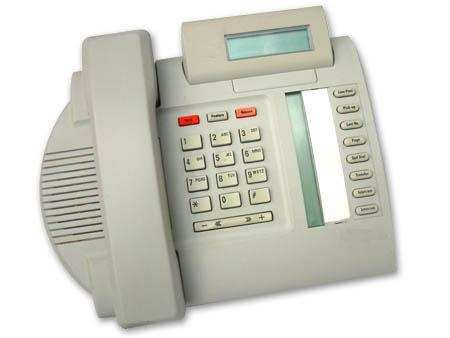





| Overview > BST Phones |






|
|
M7208N |
This type of phone cannot be used for the administration functions covered by this document. However using centralized administration from another phone, functions can be applied to the phone from another extension.

Button Numbering
The diagram below indicates the button functions during normal phone operation. The double digit numbers are the button numbering for programmable buttons.
|
Display |
|||
|
|
|
|
|
|
|
|
|
07 |
Hold |
Feature |
Release |
|
06 |
1 |
2 |
3 |
|
05 |
4 |
5 |
6 |
|
04 |
7 |
8 |
9 |
|
03 |
* |
0 |
# |
|
02 |
– |
Volume |
+ |
|
01 |
|
|
|
|
Mute |
| • | For systems running in key system mode, the first two programmable buttons, 01 and 02, are fixed as Intercom 1 and Intercom 2 buttons. Line buttons, based on the Number of Lines setting or the number of analog trunks installed in the system, are assigned from buttons 07 downwards and then button 08 upwards. |
| • | For systems running in PBX system mode, the first three buttons, 01 to 03, are fixed as call appearance buttons. |
© 2011 Avaya LLC
- Issue 3.b.-
11:29, 22 March 2011
(m7208n.htm)
Performance figures, data and operation quoted in this document are typical and must be specifically confirmed in writing
by Avaya before they become applicable to any particular order or contract. The company reserves the right to
make alterations or amendments at its own discretion. The publication of information in this document does not
imply freedom from patent or any other protective rights of Avaya or others.
All trademarks identified by (R) or TM are registered trademarks or trademarks respectively of Avaya LLC. All other
trademarks are the property of their respective owners.
Last Modified: 13/02/2011